In the ancient land of Egypt, where the Nile River flowed like a lifeline through the heart of the desert, there existed a goddess whose beauty and grace were unmatched, even among the divine. Her name was Hathor, the goddess of love, joy, music, dance, fertility, and motherhood. Revered as one of the most powerful and multifaceted deities in the Egyptian pantheon, Hathor was not only a protector of women but also a symbol of happiness, pleasure, and abundance. Her story is one of passion, power, and transformation—a tale that traverses the realms of gods and men, touching every aspect of life from birth to death. Hathor's origins are shrouded in mystery, much like the star-filled sky that stretches across the endless expanse of the Egyptian desert. Some say she was born from the very tears of Ra, the Sun God, while others claim she emerged from the waters of the primordial ocean, Nun, in the dawn of creation. What is certain, however, is that Hathor was a child of Ra, and from her earliest days, she possessed a radiance that surpassed all others. Ra, the father of all gods, looked upon his daughter with pride, for Hathor's beauty and warmth were like the sun's gentle rays at sunrise. Her laughter brought joy to the heavens, and her dance inspired the stars to twinkle brighter in the night sky. Hathor's presence was a balm to all who encountered her, and it wasn't long before she became beloved by gods and mortals alike. One day, as Hathor gazed upon herself in the waters of the Nile, she saw not only her reflection but the reflection of the world she was destined to influence. It was in this moment that she discovered the power of her own divinity. She realized that her beauty was not just skin deep; it was a manifestation of the love, compassion, and kindness she held within her heart. The mirror became a symbol of her duality, representing her role as a goddess who could nurture and protect but also bring destruction and wrath if crossed. Ra saw Hathor's discovery and gifted her a magical mirror, one that could reflect the truth of any soul that looked upon it. With this mirror, Hathor became a guardian of truth and harmony, helping mortals find balance within themselves. Her power grew, and soon she was known as the "Lady of the Mirror," capable of revealing the innermost desires and fears of all who sought her wisdom. As time passed, Ra grew weary and old, his light dimming with each passing day. The world began to fall into chaos, for without the strength of Ra, darkness threatened to engulf Egypt. Hathor, seeing her father's plight, knew she had to act. In a bid to restore Ra's vitality, she transformed herself into the most enchanting and alluring form imaginable, becoming a woman of such beauty and grace that no being, mortal or divine, could resist her charms. She danced before Ra, her movements fluid and hypnotic, her laughter like the chime of silver bells. The god could not look away, and as he watched, he felt his strength returning. It was as if the very essence of life flowed back into his veins, and once again, the sun shone brightly in the sky. Hathor's dance saved Ra from the clutches of darkness, and for this, she was forever remembered as the goddess of joy, music, and celebration. Despite her joyous nature, Hathor was not immune to sorrow. There came a time when she witnessed the suffering of the souls who dwelled in the underworld, their cries echoing through the darkness like a mournful wind. Moved by their pain, Hathor journeyed to the realm of the dead, determined to bring light and comfort to those who had been forgotten. As she descended into the underworld, her radiance dimmed, and the shadows seemed to claw at her very essence. Yet, she pressed on, her heart filled with compassion and love. When she finally reached the souls trapped in eternal darkness, Hathor began to sing. Her voice, soft and melodic, washed over the lost spirits like a soothing balm, and for the first time in countless ages, they knew peace. It was said that whenever Hathor visited the underworld, the souls of the dead would dance to her music, their sorrow momentarily forgotten. In this way, Hathor became not only a goddess of life but also a guide for those who had passed beyond the veil, ensuring that even in death, there could be moments of joy. But Hathor was not always a gentle goddess. There was another side to her, one that was fierce and unyielding. When Ra saw that humanity had grown arrogant and no longer feared the gods, he summoned Hathor and transformed her into a lioness named Sekhmet, a fearsome warrior who would bring punishment to those who had defied the divine order. In this form, Hathor was no longer the goddess of love and joy but a manifestation of destruction and wrath. She swept across the land like a storm, her claws and fangs tearing through the enemies of Ra. The Nile ran red with the blood of those who dared to challenge the gods, and the earth trembled beneath her fury. Yet, even in her rage, Hathor's compassion remained. When she saw the suffering she had caused, her heart grew heavy with sorrow. Ra, seeing his daughter’s pain, transformed her back into her original form, and once again, she became the goddess of beauty and love. From that day on, Hathor vowed to protect humanity, guiding them with her light rather than punishing them with her wrath. Hathor’s heart, which had known both the joys of creation and the sorrows of destruction, found solace in the arms of Horus, the falcon-headed god of the sky. Their love was a bond that transcended the realms of gods and men, for it was built on mutual respect, admiration, and understanding. Hathor's gentleness complemented Horus's strength, and together, they ruled over Egypt as symbols of unity and harmony. Their union brought prosperity to the land, and under their guidance, the people flourished. Temples were built in Hathor's honor, and her name was whispered in prayers and songs throughout the kingdom. She became the patroness of mothers and children, a protector of women, and a beacon of hope for all who sought her blessings. One of Hathor’s most enduring epithets was "The Golden One," a name that spoke of her radiance and beauty. Her temples were adorned with gold and precious stones, and she was often depicted wearing a golden headdress adorned with the horns of a cow, symbolizing her role as a nurturer and provider. In times of need, it was to Hathor that the people turned, for they knew that her kindness and generosity would never fail them. Her priests and priestesses became her voice, spreading her teachings of love, compassion, and joy. They would dance in her honor, their movements echoing the grace of the goddess herself, and their songs would rise to the heavens, carried by the winds to the ears of the gods. As the centuries passed, and the sands of time buried the great temples of Egypt, Hathor’s name became a whisper in the wind, a faint echo of a time long gone. Yet, even as her followers dwindled, her spirit remained, dancing among the stars, forever a symbol of love, joy, and beauty. It is said that on nights when the moon shines brightly, and the wind carries the scent of the Nile, one can still hear the music of Hathor’s dance, a reminder that even in the darkest of times, there is always light, always love, and always the possibility of joy. The legacy of Hathor lives on in the hearts of those who remember her story, a tale of a goddess who embodied the full spectrum of life’s experiences—joy and sorrow, love and anger, creation and destruction. She teaches us that true beauty lies not in outward appearances but in the compassion and kindness we show to others. Hathor’s story is a reminder that we all possess the power to bring light into the world, to dance even in the face of darkness, and to find joy in the simplest moments of life. Hathor’s story, like the ancient land of Egypt itself, is a testament to the enduring power of love, joy, and compassion. It reminds us that no matter how much time passes, the essence of beauty and kindness will always remain, like a whisper carried on the wind, forever etched in the sands of time.The Birth of Hathor
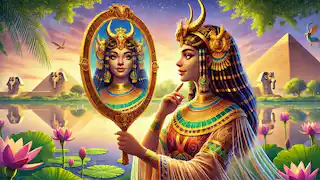
Hathor and the Mirror
The Seduction of Ra
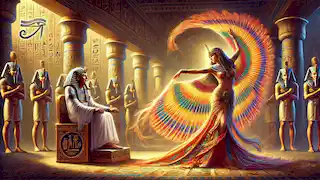
Hathor’s Journey to the Underworld
The Wrath of Hathor
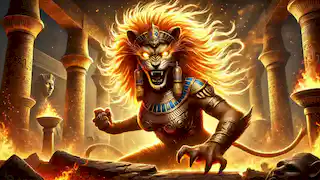
Hathor’s Love for Horus
The Golden One
The Final Dance
Epilogue: Hathor’s Legacy
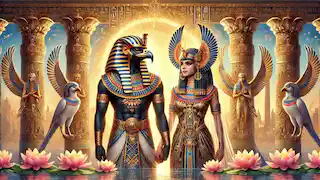
Conclusion
The Story of Hathor
Reading Time: 8 min
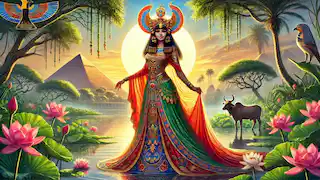
About Story: The Story of Hathor is a Myth Stories from egypt set in the Ancient Stories. This Descriptive Stories tale explores themes of Romance Stories and is suitable for All Ages Stories. It offers Cultural Stories insights. The captivating journey of Hathor, Egypt's goddess of love and joy, as she balances light and darkness.

















